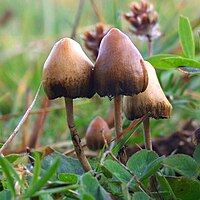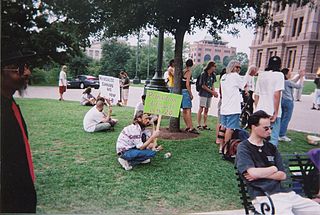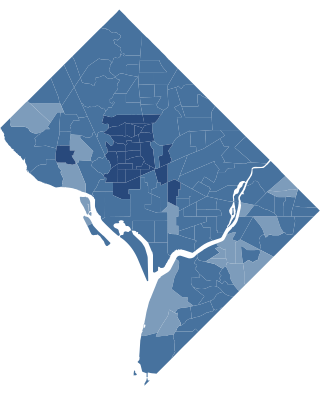Decriminalization
In May 2019, Denver, Colorado, became the first city in the United States to decriminalize psilocybin mushrooms after a ballot initiative narrowly won with 50.6% of the vote. The initiative did not legalize mushrooms but prohibited Denver from spending any resources to prosecute people for their use or possession. The law applies to adults over the age of 21, and psilocybin remained illegal in Colorado until the passing of Proposition 122 in November 2022. [15] [16] [5]
The following month in June 2019, thirty individuals testified to the city council in Oakland, California, about their prior experiences with psilocybin. Following the testimonies, the city council unanimously voted to decriminalize the drug, along with peyote. [14]
In January 2020, Santa Cruz, California, voted unanimously to decriminalize the adult possession and cultivation of psilocybin. [17] Commercial sale of psilocybin is still illegal. [10]
In September 2020, the City Council of Ann Arbor, Michigan, voted unanimously in favor of a resolution declaring the investigation or arrest of anyone for planting, cultivating, purchasing, transporting, distributing, engaging in practices with or possessing entheogenic plants or plant compounds to be the city's lowest law enforcement priority. [18] [19]
In November 2020, the state of Oregon became the first U.S. state to both decriminalize psilocybin and also legalize it for supervised non-medical use after the Ballot Measure 109 passed. [1]
In November 2020, the District of Columbia passed initiative 81; the short title of the initiative was the Entheogenic Plant and Fungus Policy Act of 2020 and it came into effect on March 15, 2021. It decriminalizes psilocybin drugs, which are psychedelics including magic mushrooms, ayahuasca, and mescaline, making arrests for their possession or use the lowest priority for DC police. [20] [21]
In January 2021, Washtenaw County, Michigan, followed suit. [22] That same month, the City Council of Somerville, Massachusetts, voted unanimously to decriminalize the possession of entheogenic plants, including psilocybin mushrooms and ibogaine. [23] [24]
In February 2021, after continuous outreach by Decriminalize Nature Massachusetts and Bay Staters for Natural Medicine, the City Council of Cambridge, Massachusetts, and in March 2021, Northampton, Massachusetts, followed. [25] [26] [27] [28] [29] [30] [31] [32]
In October 2021, the City Council of Seattle, Washington, and Arcata, California, voted unanimously to deprioritize enforcing entheogen prohibition. [33] [34] [35] [36]
On October 20, 2021, the City Council of Easthampton, Massachusetts, voted 7–0 on a non-binding resolution [37] to support ending arrests for the growing of entheogenic plants and fungi, as well as to support decriminalization of the possession of most controlled substances. [38]
On November 3, 2021, Detroit voters approved Proposal E, making Detroit the latest city to "decriminalize nature", as supporters call it. [39] Proposal E, a ballot initiative, passed with 61% of voters supporting a law that will, "to the fullest extent permitted under Michigan law", make "the personal possession and therapeutic use of entheogenic plants by adults the city's lowest law-enforcement priority". [40]
On December 20, 2021, the city of Port Townsend, Washington, adopted a resolution requesting that "investigating, arrest, and prosecution of adults engaging in entheogen-related activities, included but not limited to... should be a City of Port Townsend low enforcement priority when done in a nonpublic place". [41]
On March 22, 2022, Hazel Park became the third Michigan city to decriminalize natural psychedelics. [42]
On September 7, 2022, San Francisco Board of Supervisors unanimously approved a measure calling for the decriminalization of the use of entheogenic plants. [43] [44]
In March 2022, Colorado activists picked a psychedelic reform initiative (Proposition 122) out of three other similar initiatives and started a signature campaign to place the measure on the state's 2022 election ballot. By July 2022, the reform initiative made the Colorado ballot for the 2022 midterm elections. [45] The ballot initiative was passed in November 2022 by over 50% of those who voted. It decriminalizes the possession, growing, and sharing of five psychedelics for personal use: psilocybin, psilocyn, dimethyltryptamine (DMT), ibogaine, and mescaline, for those aged 21-years-old and over. The initiative will also legalize "healing centers" that are licensed by the state's Department of Regulatory Agencies, where those aged 21 and over can buy, consume, and take psychedelics under supervision. This healing center programme is expected to begin in 2024. It will at first only include psilocybin but allows for expansion to include DMT, ibogaine, and mescaline in 2026. [46] [47]
On February 27, 2023, Ferndale, Michigan, became the fourth city in Michigan to decriminalize entheogenic plants and fungi [48]
In May 2023, Jefferson County, Washington, decriminalized the use of entheogenic plants and fungi. [49]
On July 11, 2023, Berkeley, California, became the fifth city in California to decriminalize entheogenic plants and fungi [50]
On July 23, 2023, Minneapolis, Minnesota, decriminalized entheogenic plants and fungi via mayoral executive order [51]
On October 3, 2023, the City Council in Portland, Maine, has voted to deprioritize the local enforcement of laws against psychedelic plants and fungi. [52]
In October 2023, 'Massachusetts for Mental Health Options' received approval from the state attorney general to pursue a ballot initiative for the 2024 elections. This initiative seeks to legalize psychedelics, including home cultivation of entheogenic plants and fungi, in Massachusetts. [53]











